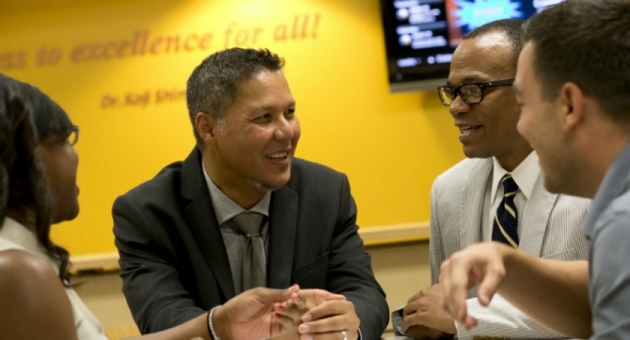Giving new meaning to an education degree
Dean transforms college by redefining urban education

Gregory Anderson, dean of the College of Education, is one of six new deans hired by President Neil D. Theobald.
Since becoming dean in 2013, Anderson has worked to create programming that increases the value of an urban teaching degree.
Before coming to Temple, Anderson served as dean of Morgridge College of Education at the University of Denver, was a tenured faculty member in the Higher and Postsecondary Education program at Columbia University’s Teachers College, and served as a higher education policy officer in the Educational Opportunity and Scholarship programs at the Ford Foundation, where he oversaw one of the foundation’s largest portfolios.
His innovative vision is leading the College of Education on a new path to train educators equipped to succeed in all fields and industries.
Several U.S. colleges and universities are getting rid of teacher education programs. Though Temple doesn’t have plans to end its program, what do you perceive as some of the challenges facing the College of Education?
We acknowledge the national challenges in teacher education, specifically enrollment decline and criticism of teachers. The demand for a teaching degree is on the decline; it’s not something we can reverse. While we remain highly regarded and well known for teacher education, now is the time to rebrand the college. We can change what we offer to students and increase the value of their degree.
How do you plan to redefine teacher education and improve enrollment in the College of Education?
We have begun to shift the conversation so that urban education, a hallmark of our program, is viewed as one of the many values of enrolling in Temple’s College of Education. In other words, experience in urban education is indeed a valuable asset. However, it doesn’t mean you’re destined for an urban teaching job or only qualified for an urban teaching position.
We give students opportunities to be change agents. Our alumni, who are some of the best teachers in the suburban and rural districts, tell us that Temple’s emphasis on urban education has helped them a great deal, even when not employed in an urban district.
Does the changing face of urban education dictate the way teachers are trained in the College of Education?
In diverse districts like [Pennsylvania’s] Cheltenham or Upper Darby, which are not viewed as urban areas per se, teachers still have to grapple with issues pertaining to demographic changes in society. By giving our students access to the urban component through the Temple Teacher Residency program, we guide new teachers on ways to become more effective at handling complicated issues like diversity, variation in socioeconomic status, English as a second language and other matters that are no longer only relevant to urban centers.
Since your appointment you’ve been closely involved with the Philadelphia School District. How will the College of Education partner with local education organizations to improve the quality of education in Philadelphia?
We have assets that go way beyond teacher education. We offer college pathways programs that help high school students get into and succeed in college. We also have strengths in supporting students with intellectual disabilities and spectrum disorders. In addition, we have faculty policy expertise focused on racial disparities and the digital divide that we are integrating into all of our programs, degrees and internships.
The primary role of the College of Education has been to prepare teachers to be engines for change. We know that education needs to change in order for children in this nation to have an equal opportunity for success. In working to make this change, we began to think about our collective impact, starting with North Philadelphia, the community we share space with, and what makes every child successful. We believe that starts with access to quality early education and are thrilled to be partnering with the Pennsylvania-based Montgomery Early Learning Centers to develop plans for a preschool that will serve children in the North Philadelphia community.
We want the college to embrace different ways of being successful, as a fiscally responsible institution that thinks like a business but never abandons its public-good mission.